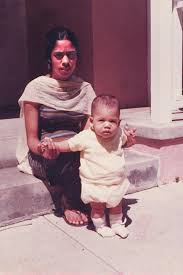
The photograph is faded, possibly a polaroid. There is a woman with brown skin and long black hair, wearing a salwar kameez, helping to steady a black-haired toddler on the white steps.
My breath catches, as I recognize my own life in that photo. It is the life handed down from my ancestors to my parents, and then to me.
Watching #KamalaHarris’ biopic before she accepted the nomination for VP of the Democratic ticket, I am viscerally transported to pivotal moments in my life.
…
When I was three, we moved from a small apartment to a house in a suburban NJ neighborhood. I loved my room, with the pepto-bismol pink walls where I played with my toys and sat in my toddler-sized chair. At night, however, I was scared, and my bedtime ritual included turning on the nightlight my parents bought at Woolworth.
One day, I overheard my parents, distressed, arguing about their money struggles. I became nervous and resolved to do what I could to help ease their need for money. From that night on, I stopped turning on my nightlight, and instead, ran into bed and slept on my stomach with my hands clenched over my heart, tense with fear until I fell asleep.
…
In my middle school and high school years, there were the inevitable culture clashes with my parents who were of a different generation as well as a different country. My adolescent self bounced between deciding whether to conform to the mainstream or hold on to my ancestral heritage.
When I asked for brand-name clothes or “talked back”, my parents warned me not to become “like one of those ‘Umricans’”. The message seemed clear – we were different and they wanted me to stay true to our culture. (“Umricans” were seen as entitled and disrespectful to their elders). However, when I would speak out to uphold what I thought were our family’s values of fairness and standing up for the powerless, they would say, “keep your head down”, “don’t rock the boat”.
…
In some ways, trying not to rock the boat suited me just fine because I didn’t want to stick out more than I already did – I wasn’t allowed to hang out with friends after school (because I could be tempted by drug dealers at the local Papa Gino’s), and sleepovers were out of the question (because I could get molested by a friend’s brother or father). Staying within my small group of academically-oriented friends, and being invisible with everyone else kept me safe.
Periodically, the cloak of invisibility would be ripped away. One year, I was bullied daily by a white kid two years younger than I, using a slur about being Hispanic. It seems that the typical deference afforded to 8th graders didn’t apply if you had brown skin. These types of incidents would catch me like a deer in headlights, and left me feeling humiliated, physically weak, emotionally fragile, and anxious.
…
Fortunately, it was different on the weekends, which we spent with my Bengali-American community for social or religious gatherings. Other kids understood the struggles of feeling like an outsider at school, and the cross-cultural tensions at home. I felt a release from the constant vigilance required in the rest of my life. The community was a true gift, and many of those childhood friends remain my closest friends to this day. (The community absolutely wasn’t all rainbows and roses, but that’s an essay for another day.)
…
Over those years, I learned to use my invisibility to observe people, and developed a gut sense about people’s motivations and insecurities. I gained empathy for people’s struggles. I never became materialistic. I learned that we are not entitled to things always getting better.
These lessons started out as coping strategies to protect myself from pain, heartache and unpredictability.
Then they turned to strengths. Strengths that serve me in the workplace. I navigated the complexity of multiple perspectives. I intuited what supervisors needed, even when they could not effectively articulate what they wanted.
I spoke out about underlying dynamics of power and stood up for people of color when they were stereotyped, excluded, or not valued. These actions were not performative – they were deeply personal.
…
In this country, we have a narrative about immigrants, which includes the many hardships they have to overcome. Immigrants and their descendants amplify that message (Raise your hand if you have a version of ‘I arrived with $7 in my pocket at JFK airport and didn’t know anyone’?).
But my journey is not just a series of hardships that my family and I had to overcome. With Kamala Harris stepping onto the VP stage, in part because of her lived experiences, I now see my journey as a #daughterofimmigrants as my very own intellectual property.
See, the middle school bully probably felt like he was winning because he felt power over me. But, in overcoming his ignorant taunts, I gained my own source of renewable power.
I have learned the rules of this system, but can challenge its shortcomings. I am no longer intimidated by the bullies, popular kids or those above me on org charts. My empathy fuels my vision of a system that works for the collective, not only those at the top. And living in alignment with my values brings me profound peace.
This positions me, and others like me, well in a country that might finally be ready to grow into its stated ideals. Let us lead.
#daughterofimmigrants
#BengaliAmerican
#indianamerican
#asianamerican
#immigrantswegetthejobdone
#letuslead
#empathyispower
#collectiveconsciousness
#BLM
#JusticeforBreonnaTaylor
